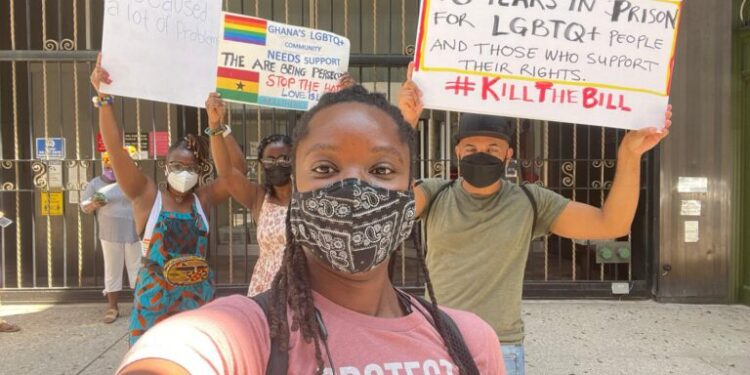A bill that proposes to widen the scope of criminalised same-sex relationships and enhance penalties in Ghana has won support among proponents of Christian, traditional, and cultural values, while at the same time invoking the opposition of activists, and defenders of human rights and freedom of choice.
Although the proposed Ghanaian law stands out because it aims to go beyond just criminalising same-sex relationships and targets anyone who expresses support or sympathy toward lesbian, gay, bisexual, and transgender (LGBT+) friends, coworkers, family members, or neighbours, it is not unique in the continent. Some 33 African countries are reported to have laws that make consensual same-sex relations a criminal offence.
The Promotion of Proper Human Sexual Rights and Ghanaian Family Values Bill 2021 proposes a 10-year jail sentence for people who promote LGBT+ rights through mainstream or social media, including expressing sympathy or offering social or medical support.
The bill proposes a fine or a prison term of up to three years for anyone found “practising and engaging in same-sex relationship.”
The bill also promotes gay “conversion therapy”, a controversial practice that claims to change a person’s sexual orientation or gender identity or expression. Religious groups promote the concept that an individual can change their sexual orientation or gender identity, either through prayer or other religious efforts.
Church groups have been vocal in their support of the bill, with Ghana’s Anglican bishops issuing a statement to endorse it and terming LGBT+ beliefs “unbiblical and ungodly” and against Ghanaian tradition and culture.
But some academics, lawyers, and civil society leaders in Ghana have opposed the law, saying it violates human rights.
BBC listed lawyer Akoto Ampaw, who in 2020 lead Ghanaian President Nana Akufo-Addo’s defence team in a presidential election petition, among the opponents of the anti-LGBTQ bill.
“The bill violates virtually all the key fundamental freedoms guaranteed under the constitution” Ampaw was quoted as saying.
The group explained that the proposed law threatens fundamental human rights which everyone should enjoy regardless of their sexual preference or orientation. It said the endangered rights include freedom of speech and expression; the right to assemble; freedom of association; the right to organise; the right to freedom from discrimination; and the right to human dignity.
President Akufo-Addo has called for civil debate and tolerance as parliament works towards a vote on the bill. The first reading of the bill took place in August 2021, and it has yet to be debated by lawmakers.
The president has in the past spoken out against same-sex marriage, saying it would never be legalised while he is president.
The proposed law came just months after police raided a new LGBT+ community centre in the capital Accra in February 2021, citing the existing anti-gay laws. The centre was later shut down.
In May 2021, the Ugandan Parliament passed the Sexual Offences Bill, which contains a clause that criminalises same-sex relationships. This was not the first time that the Ugandan government had introduced such laws. In 2013 the Anti-Homosexuality Bill, which proposed the death penalty for anyone convicted of engaging in homosexuality, was passed. Gay rights defenders successfully challenged the law at the Supreme Court on legal technicalities. However, they have expressed fears that the new law has simply brought back elements of the earlier one.
David Kato, a gay man and activist for the rights of lesbian, gay, bisexual and transgender people, was beaten to death at his home outside the Ugandan capital Kampala on January 26, 2011. It was speculated that he was the victim of a homophobic attack.
In Botswana the government has appealed a 2019 court ruling that decriminalised gay sex, which previously attracted a seven-year prison sentence. The judges postponed their ruling on the appeal without setting a date, saying they needed more time to research and debate the matter.
Zambia’s President Hakainde Hichilema denied holding talks on gay rights during his trip to the United Nations General Assembly in New York in October 2021. Same-sex relationships are criminalised in Zambia. “We did not go there to talk about lesbian rights. We did not go for that. This is a point I want to make emphatically,” he is quoted as saying by the Zambia Daily Mail.
In 2019 the United States called out the Zambian government for the imprisonment of a gay couple.
In Malawi, two men were convicted of “unnatural offences” and “indecent practices between males” under sections 153 and 156 of the county’s Criminal Code in 2010. The magistrate sentenced them to 14 years in prison, but President Bingu wa Mutharika bowed to international pressure and pardoned them on “humanitarian grounds”.
The High Court in Lilongwe commenced a review of the constitutionality of the section in the penal code that punishes “carnal knowledge against the order of nature”, which attracts up to 14 years in prison. The process, which commenced in 2013, has not made any notable progress due to procedural issues.
The High Court in Kenya on May 24, 2019 upheld laws criminalising homosexual acts. The ruling was addressing a petition filed in 2016 by three Kenyan organisations that protect the rights of lesbian, gay, bisexual, and transgender people. The groups had expressed concern that the criminalisation of same-sex conduct interferes with and violates the rights to equality, non-discrimination, human dignity, security, privacy, and health, all of which are protected under Kenya’s constitution.
Chad criminalised same-sex relations for the first time in 2017.
Members of the LGBT+ community in many African countries that do not tolerate them have been attacked both by mobs and members of their own families, and subjected to sexual assault, intimidation, and extortion. In most cases the perpetrators are not prosecuted or charged.
A few African countries have revoked anti-homosexuality laws through their penal code reform in recent years. These include Seychelles, Mozambique, Sao Tome and Principe, Angola, and Lesotho.
South Africa is the only African nation to allow gay marriage.







